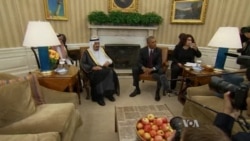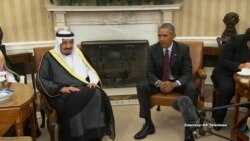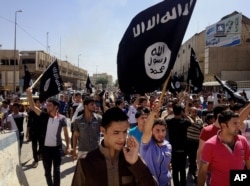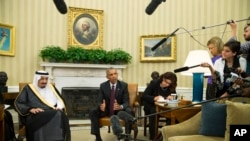Meeting with President Barack Obama at the White House Friday, Saudi Arabia' s King Salman expressed support for the nuclear agreement between Iran and five Western powers, including the United States.
The White House said the two leaders "affirmed the need ... to maintain security, prosperity and stability in the region."
Saudi Arabia has previously voiced reservations about the agreement, which will stands to bolster the economy of its adversary, Iran. The deal will lift severe economic sanctions on Iran in exchange for strict limits on its ability to develop nuclear weapons.
It was the the Arab leader’s first visit to the United States since ascending the throne in January, following the death of King Abdullah.
The talks between Obama and the king could not come at a more tumultuous time, as a U.S.-led coalition fights Islamic State militants in Iraq and Syria, and a Saudi-led coalition beats back Iranian-supported Houthi rebels in Yemen.
The White House also says the U.S. shares Saudi Arabia's concerns about Yemen, as well as Saudi concerns about the crisis in Syria.
Appearing before reporters prior to talks, Obama said the U.S. shares the king's desire for an inclusive government in Yemen that can relieve that impoverished Arab country's humanitarian crisis.
“This is an important visit at an important time, with the many developments in the region where we have shared interests with Saudi Arabia and with the recent conclusion of the Iran deal and the follow-up of the Camp David summit with Saudi Arabia and our other Gulf partners,” Deputy National Security Adviser Ben Rhodes said.
Watch related video
Conflict in Yemen
Saudi Arabia has also been concerned about Iran's role in its southern neighbor Yemen, where Tehran is supporting an ethnic Houthi rebel force that has taken over parts of the country. In his remarks at the Saudi embassy, the foreign minister said he hopes the money Iran receives from sanctions relief will be used for domestic development and not for "nefarious activities in the region."
Since ascending the throne in January, King Salman has mounted an aggressive foreign policy, regularly bombing the Houthi rebels.
The Obama administration is offering Saudi Arabia new U.S. military aid and training; The New York Times reports the $1-billion arms deal provides weapons for the Saudis’ fight in Yemen. However any such deal would require approval from the U.S. Congress.
“The Saudis have now been at war in Yemen since March," said Tom Lippman, an analyst is with the Middle East Institute in Washington. "They’ve used up a lot of ammo, may have lost a couple of airplanes. This is part of an ongoing military sales relationship, in fact, this is considerably smaller than the last arms deal that was approved.”
US assurances on Iran
Friday’s meeting at the White House is the first since a May 14 summit, during which Obama spent time with Gulf Cooperation Council leaders assuaging any concerns about brokering a nuclear agreement with Iran.
“Many people in the Gulf, in fact the entire Arab World, are concerned about the U.S. position in the Gulf, about the Iran nuclear agreement, about what is happening in terms of Iran’s expanding influence in the Levant, in Iraq, in Yemen,” said Anthony Cordesman, a security analyst with the Center for Strategic and International Studies.
Cordesman said dialogue will be critical to building Saudi confidence, particularly in the recently negotiated Iran nuclear agreement.
“They have to be firmly convinced the United States is going to enforce it, is not going to ignore any violations, they will take a hard stand on it,” he said.
While noting Saudi Arabia has already expressed support for the deal, Rhodes acknowledged Saudi concerns about Iran getting their hands on some $56 billion in assets due to sanctions relief.
“Iran is in such a significant economic hole that it is our belief that they are likely to spend that money on issues related to improving their economy,” Rhodes said. “We also acknowledge the fact that we need to ensure that we’re doing everything we can to counter Iran’s destabilizing activities in the region. And there’s always a risk that Iran could spend funds on those nefarious activities.”
Building Saudi capabilities
Saudi Arabia’s focus, security analyst Cordesman said, is more on the Iranian buildup of missile force and asymmetric war capabilities “than the possibility they may go nuclear in the future.”
To that end, White House officials say Friday’s discussions will also center on increased security cooperation to build Saudi capacity in dealing with a potential Iranian threat – but not necessarily through the delivery of conventional large-scale systems and heavy weaponry.
“It’s a conversation that we’ve continued under the radar in these working group meetings -- really rolling up our sleeves with our experts in departments and agencies to build out a whole range of capabilities in the areas including border security, maritime security, cybersecurity, counterterrorism,” said Jeff Prescott, National Security Council Senior Middle East Director, in comments to reporters.
Administration officials say it’s not just concerns about Iran’s activities in the region, but the asymmetric tactics used by extremist groups like the Islamic State that call for “more nimble 21st-century capabilities in areas like cyber [security] and maritime and special forces.”
Regional conflict
Beyond the nuclear deal, Iran’s behavior likely will also factor into the two leaders' discussion on Iraq.
Former U.S. ambassador Francis Ricciardone, now director of the Atlantic Council’s Rafik Hariri Center for the Middle East, said Saudi Arabia has a stake in seeing its northern neighbor stabilized.
“I should think the discussion between President Obama and King Salman on Iraq will be very interesting, as to what each side can do to support Prime Minister [Haider] Abadi in holding that country together and strengthening its independence from a hegemonistic influence,” said Ricciardone.
Ending the fighting, urging a political solution and addressing a humanitarian crisis are goals both leaders likely will push for, not just in Iraq and Syria, but in Saudi Arabia’s southern neighbor, Yemen, where Saudi airstrikes continue to pound Houthi rebel targets on a regular basis.
The Gulf nation has come under fire for its bombing campaign, which has killed hundreds of Yemenis in strikes hitting civilian targets, including a dairy factory and residential compounds.
The United Nations says more than 2,100 civilians in Yemen were killed in the conflict between March and July, the majority from coalition airstrikes, for which the United States is providing logistics and intelligence support.
Human rights
“Obama and Salman should discuss the Saudi-led bombing campaign and agree to end indiscriminate attacks that have killed countless Yemeni civilians,” said Sarah Leah Whitson, the Human Rights Watch middle east director, in a release. “The U.S. should recognize that the role it’s playing in military operations in Yemen may also make it responsible for laws-of-war violations by coalition forces.”
White House officials said one can expect an “expression of concern” during Friday’s talks.
“With respect to Yemen, we have very deep concerns,” Rhodes said. “We are able, because it’s the nature of our relationship, to again provide certain types of support to the efforts in Yemen, but also, I think, to be frank, when we believe that more care needs to be taken to avoid civilian casualties. And that will be an ongoing position that we take.”
Human Rights Watch also urged Obama to press King Salman on other rights issues, saying the Saudi leader has "largely failed" to improve his country's human rights record during his first seven months in power.
"Under Salman, Saudi Arabia has continued to execute people in record numbers, including nonviolent drug offenders; repressed pro-reform activists and peaceful dissidents; failed to take steps to protect the rights of foreign workers; and maintained its systematic discrimination against women and religious minorities," HRW said.
















